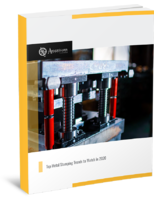Barcode Reader Smoothes Courthouse Parking Blues

Municipal parking lots are icons in a modern automobile society, the destination of harried motorists, the first and last impression of a facility's integrity. Parking lots have high profile, ensure convenience, and can have far reaching consequences when parking space runs short.
Such was the case at the Superior Court of the Virgin Islands in St. Croix, formerly known as the Territorial Court of the U.S. Virgin Islands. Parking at the Christiansted surface lot serving the two-story judicial building recently became scarce. The courthouse boasts numerous courtrooms, administration offices and law library that serve the island's legal procedures. One popular place is a very active marriage license division where locals and tourists rub shoulders, queuing up for Caribbean-style ceremonies.
St. Croix, U.S. Virgin Islands (USVI), is the largest of the U.S. Virgins at 82-square-miles, with a diverse culture, brass bands, carnivals, watersports, great shopping and casinos. A dreamy vacation spot, it has lush terrain ranging from tropical rain forest with lofty broad-leaved evergreen canopy, to flat-desert vegetation, and from Danish colonial architecture to modern luxurious resorts. On the one hand, the tiny Crucian isle attracts visitors seeking a laid-back atmosphere complete with pristine sandy white beaches. On the other hand, a local community thrives daily, conducting business as usual at hospitals, schools, government and legislative centers.
At the courthouse, some 300 parking spaces are gobbled-up daily by jurors and court administrators as well as the judges, media, students, researchers, lawyers and their clients. Electronic sliding gates and barcode readers serve to keep visitors out of the reserved employee parking. The gates are triggered by barcode readers, which decode decals attached to authorized vehicle windows. Numbers are checked against the system's internal database. Bypassing visitor traffic, employees can enter the reserved parking area, driving through, hands free, as fast as the gate will cycle.
Edwin "Eddie" Golden, of Golden Security Services, of Christiansted, St.
Croix, said he originally installed two BA-200 Barcode Readers, by Barcode Automation, inc. (BAI) of Winter Springs, Florida, three years ago. At the time, the courthouse administrators searched for a cost-effective parking control solution, featuring simple functionality. Having worked with the barcode readers at private communities, Golden was already sold on the BA-200. He said he liked BAI's service record, the company warranty, and the expert technical support available. Another plus was the flexibility of the units integrating with other security systems via RS232 port, or Wiegand bit format.
"When the units were originally installed, it was a big change for folks at the courthouse. But everyone has adjusted well," Golden said. "We've actually had very good luck with the barcode readers."
Unfortunately, over the past three years, empty slots in the employee lot soon decreased as building occupancy increased. This left court judges and marshals sometimes scrambling for empty spots while the wheels of justice stalled. Once again, Golden was called.
After a brief assessment, he determined the ID numbers in the BA-200 database could be edited. Rather then replace the automatic vehicle identification system, Golden suggested they simply reconfigure the barcode readers, permitting entry only to judges and court marshals at spots near the courthouse entry.
Golden said, the idea went over well with the facility managers who favored keeping the system. The fact was that during the past three years the units had endured tropical sun glare, extreme heat and hurricanes without skipping a beat. He was told that maintenance was minimal and easily accomplished. Plus, the decals proved economical in situations with frequent employee turnaround.
Using a laptop computer, Golden set about reconfiguring the BA-200 as proposed. He quickly accomplished what the court marshals had requested; getting out of jurisprudence's way before court went back into session.
"It appears the marshals considered the situation of utmost importance," he said. "So I am glad we were able to comply. The system actually works just fine. For me, the job was easy, mainly involving changing codes. The quick fix was appreciated by everyone, and so now the judges and marshals are happy."
Barcode readers for vehicle access control were first pioneered over 15 years ago, but in the early years met with limited success. Then in 1997, BAI introduced the BA-200. Soon thereafter, the device developed a reputation for long term reliability and easy maintenance. The modular components sealed in a sleek NEMA 4 standard box weathered well in all climatic conditions. The barcode reader quickly became the security administrators' choice for automatic vehicle identification and access control at Floridian resorts, private communities, university campuses, industry and military installation.
The BA-200 is designed to ignore photocopies. At BAI, they also offer 56 different color combinations to choose from, which works well for color-coded parking areas, making unauthorized vehicle standout.
BAI is the leading manufacturer of barcode systems for automatic vehicle identification and access control offering products through a network of nationwide dealers and integrators. The BA-200 system provides the user a highly effective tool for managing right of entry into private or secured or reserved areas that require high standards of vehicle access control.
For additional information visit www.barcode-automation.com, or call 800-528-9167.
Contact:
Carmen Manly
Public Relations Manager
Barcode Automation, inc.
PO Box 195268
Winter Springs, FL 32719-5268
Telephone: 800-528-9167
carmen@barcode-automation.com




